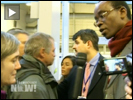
Related
Longtime activist Nnimmo Bassey has been awarded the 2010 Right Livelihood Award for “revealing the full ecological and human horrors of oil production” by multinational corporations in Nigeria and for his leadership in advocating environmental justice and human rights throughout the world. During his speech, Bassey blasted rich nations for their efforts to use carbon markets as a mechanism to mitigate global warming. [includes rush transcript]
Transcript
AMY GOODMAN: Next year’s U.N. climate talks will be taking place in Durban, South Africa. Well, while environmentalists are gathering from around the world here in Cancún for these U.N. climate change talks, the Nigerian activist Nnimmo Bassey was in Stockholm, Sweden last night to receive the Right Livelihood Award, known as the Alternative Nobel. He won the award along with Brazilian-Austrian Bishop Erwin Kraeutler and representatives of organization Support Activities for Poor Producers of Nepal, as well as Physicians for Human Rights Israel. Nnimmo Bassey is the executive director of the Nigerian group Environmental Rights Action and chair of Friends of the Earth International. He spoke in the Swedish Parliament last night at the Right Livelihood Award ceremony.
NNIMMO BASSEY: Climate change is a clear manifestation of what can happen when a mode of civilization is driven by factors that are clearly destructive. The fossil fuels-driven civilization has driven humanity to the brink, often termed the tipping point, with regard to the climate crisis. The time has come for action to be taken to reverse the trend. The time has come for the world to look away from the carbon-driven development path and its governing mentality. It is time to end carbon offsetting and carbon speculations as solutions to climate change. We have to see trees for what they are and not pretend that they are nothing more than carbon stocks.
The false solutions being paraded at the conference of the parties going on at Cancún can get as shocking as when organized climate crimes are rewarded with carbon credits and cash. An insulting example is one where the World Bank plans to extend support from the carbon trade route to gas flare projects in the Niger Delta. The unethical base of this scam can be seen in the fact that gas flaring has been an illegal act in Nigeria since 1984. And there is no way the halting of an illegal activity should end carbon credits — except if the entire carbon trade bazaar is a scam.
It is time to say no to the pretense that agrofuels can replace fossil fuels or that they are renewable and green, when it is clear that they are not. The focus on agrofuels has led to massive land grabs in Africa. This has meant marginalization of the poor, pressures on food supplies, diversion of land from food crop production, deforestation, and abuse of human rights, to mention just a few. It has also been seen by the biotech industry as a crack in the door, allowing them to introduce genetically engineered crops where such would ordinarily be resisted and rejected.
It is time to establish an international climate crimes tribunal, as proposed by the Peoples Agreement drawn up in April 2010 at Cochabamba, Bolivia. Such a tribunal would function in a way comparable to the International Court of Justice, where crimes against humanity are tried. The climate crimes tribunal would try any sort of environmental crime that harms Mother Earth, and thus the right of the people for a safe environment. These would be seen as crimes against humanity. Culprits to be tried would include polluters such as those in the extractive industry. It would also put corporations, as well as their directors, in the dock for climate and environmental crimes, which are, in effect, crimes against humanity.
Permit me at this point to remember a man who fought courageously against environmental damage by a dangerous machinery of state and the corporations. Ken Saro-Wiwa, who received the Right Livelihood Award 1994, a year before he was hanged by the military that was in power in Nigeria then, he stood for nonviolent resistance to erosion of environmental rights and socio-political justice. Although he lost his life at the hands of undemocratic forces, the path he charted remains the only way viable — the only viable option and way out of the Niger Delta quagmire. I salute the courage of all those who toe this path for the resolution of conflicts. I salute the suffering communities and peoples resisting destructive extraction. It is their courage that sustains our struggle.
AMY GOODMAN: Nnimmo Bassey, executive director of the Nigerian group Environmental Rights Action. He’s chair of Friends of the Earth International, speaking last night in the Swedish Parliament at the Right Livelihood Award ceremony. You can go to our website at democracynow.org to see our interviews with Nnimmo Bassey and watch him ejected by authorities at last year’s climate talks in Copenhagen.












Media Options